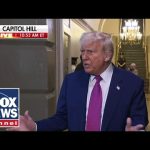In a political landscape increasingly dominated by appearances and perceptions, the importance of transparency and accountability is paramount. Yet, when it comes to the leadership of a nation, particularly the President of the United States, these attributes take on an even greater significance. The candid discussion surrounding the coverage of President Biden’s health and mental acuity sheds light on a crucial issue that affects voters and governance alike. The recent reflection on this coverage serves as a telling example of the media’s responsibility, or lack thereof, to address concerns that matter to the American people.
Many voters are aware that President Biden, given his age, has faced scrutiny concerning his ability to execute the demanding duties of the presidency. Despite promises of transparency, there seems to be a pattern where these vital concerns were not adequately pressed during key interviews. While discussions about crucial subjects like foreign policy and national security are inevitable, the failure to delve into the President’s physical and cognitive fitness is a considerable oversight. This lack of rigorous questioning leaves voters with more questions than answers about whether the President can fulfill his role effectively and efficiently for the entirety of his term.
The notion that the media occasionally drops the ball isn’t new, but the implications of such failings are profound when it comes to the health and acuity of a sitting president. Accountability in journalism is essential, and it is disappointing when members of the press, who are tasked with holding leaders accountable, acknowledge missed opportunities only in hindsight. When the opportunity arises to interview figures of significant political power, journalists must seize the chance to ask the tough questions, ensuring that they are not merely mouthpieces for rehearsed talking points.
The essence of the discussion about President Biden’s health is not to belittle or to sensationalize his age but rather to address voters’ legitimate concerns. After all, a leader entrusted with the responsibilities and pressures of the presidency should be capable of handling them. Aspects of health and cognitive ability should not be taboo subjects when it comes to discussing the fitness of our highest-ranking officials. The expectation is not for the media to act as adversaries but as stewards of the public trust, providing the electorate with the information necessary for informed civic participation.
Ultimately, the discussions sparked by this example serve as a reminder that the press must adapt and respond to the concerns of the populace. The electorate deserves a nuanced understanding of the leaders they choose, and journalists play a pivotal role in that process. The stakes are too high to allow such opportunities for inquiry to slip by unchecked, and as this reflection shows, there is always room for improvement in the pursuit of truth and transparency.




